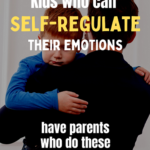We all have a tremendous desire to connect and actively engage in our child’s life. When parents interact totally, children often feel enhanced confidence, a sense of surety, and a rise in self-esteem. They tend to flourish in school, excel in extracurricular interests, and find delight in their hobbies.
But is it possible to get too deeply involved? It’s crucial to recognize that, as you get more interested with your school-aged child’s activities and academics, you must walk cautiously to detect the limit between healthy participation and overinvolvement.
Keep in mind that you are going into your child’s world. It’s vital not to trespass too much upon their personal space. Children need the freedom to explore, learn, and grow their unique skills, talents, and abilities freely. In our zeal to help our kid achieve, it’s easy to interfere when we perceive they are handling activities wrongly or poorly. However, it’s crucial to remember that you, too, previously had to learn information from your own experiences. Now, it’s their turn to begin on their learning adventure autonomously.
Your position should entail being a source of encouragement and steadfast support for your kid, paired with sincere appreciation when they do wonderfully. But it’s equally vital to take a step back and enable your kid to learn from their own failures and develop their individual approach to different jobs. Drawing from our own life experiences, we recognize that there is frequently more than one road to achieve a goal. Just because your kid picks a different way from what you could have envisioned doesn’t constitute it erroneous. In fact, it might open up a fantastic chance for you to learn from your child’s unique viewpoint.
Additionally, it’s best not to become extremely dominant or excessively curious about their social life. It’s crucial to make yourself accessible when your youngster needs your company and encouragement to express their issues with you. However, it’s equally vital to respect their demand for personal space and isolation. If they indicate a reluctance to address some things or demand time to consider and solve difficulties independently, it’s vital to acknowledge their desire for autonomy and reassure them of your unchanging availability. This path of self-discovery and autonomous problem-solving is a crucial component of their transition into adolescence and adulthood.
Our basic urge as parents is to make meaningful relationships and actively interact with our children. When parents engage themselves totally in their children’s life, it typically results in enhanced self-assurance, heightened self-esteem, and success in multiple domains, including academics, extracurricular activities, and hobbies.
However, is it feasible to get too involved? It’s vital to appreciate the delicate balancing between active involvement and undue meddling as you get more actively engaged in your school-aged child’s activities and academics.
Always keep in mind that you’re going into your child’s world. Nevertheless, it’s also vital not to trespass unnecessarily on their personal space. Children need space to explore, learn, and nurture their skills, talents, and abilities independently. At times, in our enthusiasm to help our child’s achievement, we may be tempted to interfere when we perceive they are approaching things erroneously or poorly. Nonetheless, remember that you, too, once went on a road of learning via your own experiences. Now, it’s their chance to go off on their own road of discovery.
Concerning their social lives, it’s smart not to become too controlling or overly interested. Be there when your kid needs your friendship and encourage them to confide in you when they experience hardships. Nevertheless, if they express a desire to keep some items private or require time to consider and resolve concerns independently, respect their need for solitude and emphasize your steadfast availability whenever they are prepared. This voyage of self-discovery and independent problem-solving is a crucial aspect of their transition into adolescence and adulthood





